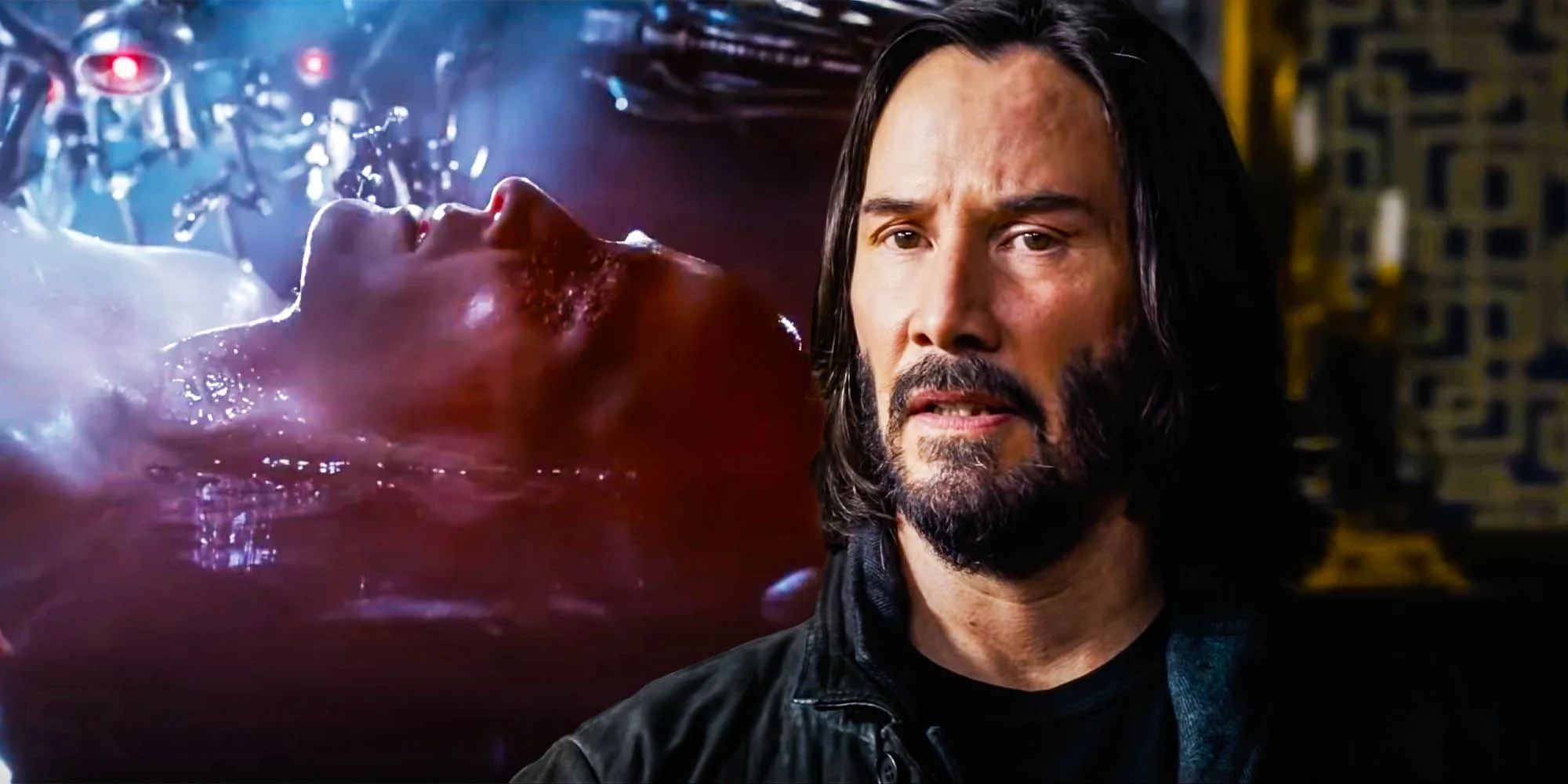Overthinking It: Matrix 4 is about choosing the blue pill.
This is the first entry in “Overthinking It”, a series of blog posts where I joyfully read a little too much philosophy and politics into movies of questionable quality. This is distinct from my writing about videogames, where all my analysis is completely serious.

Matrix 1 was about “true reality” versus false simulation. Matrix 4 asks if we prefer nonfiction-style realism versus fiction-style emotional narrative.
Partway through “The Matrix: Resurrections”, Neo’s therapist is revealed to be the villain of the movie and the current controller of the matrix-simulation. The therapist reveals that the matrix-simulation has been re-configured under his new management — instead of aiming for the “fussy facts and equations” of a perfectly realistic simulation of human society, the new matrix-simulation is a deliberately incoherent dream-world designed to stimulate maximum emotional drama by dreaming up dramatic stories and conflicts: “can you catch the bullet in time”?
The therapist explains that the reconfigured simulation has been setting new productivity records — the machines can extract more energy per person, and ironically people are less likely to question the veracity of a dream-world that panders to human psychology than they are to question a realistic simulation of a coherent human society.
In the original Matrix movie, the “human world” of 1999 New York is tinted a sickly green — besides giving the movie a distinct visual style, green is associated with the green text of old-fashioned computers and thus symbolized the fact that the matrix-simulation isn’t the real world. Only the “machine world” has a reasonably even (albeit drab) color balance. The basic theme is something like: “true reality vs familiar illusion”.
But in Matrix 4, the “human world” of 2020 San Francisco is cartoonishly oversaturated — the bright colors symbolize how the matrix has been redone as a narrative-friendly dreamworld. Matrix 4 pretends to be about the original theme of bravely choosing truth over lies, but secretly it is about choosing the colorful emotional drama of human feelings and narrative over the boring technicalities of realism.

A three-act descent into feelings-world.
Matrix 4 is kind of a three part movie:
- The first part of the movie is a twisty and disorienting story about philosophical questions and cultural criticism. Neo is struggling to tell what’s real — he can’t decide whether to believe he’s trapped in the matrix-simulation or believe he’s a game designer struggling with severe mental illness. (This part of the movie also includes a lot of funny, meta commentary about videogames, sequels, and the fact that they’re making yet another Matrix movie.) Personally this was my favorite part of the movie, since I am always a sucker for intellectual ideas and weird experimental forms of media. The portrayal of Neo not knowing what’s real was powerful and sympathetic, and the complicated stream of references to / commentary on the original movie was interesting to follow.
- Then, the middle part of the movie contains a lot of gun-fighting action scenes and a lot of detailed lore about what happened next in the fictional universe of the Matrix trilogy — Zion is now a much bigger city called Io, the machines are fighting each other and also some machines are friends with the humans, the matrix-simulation has been reconfigured to be a feelings-based dreamworld instead of a realistic simulation. We catch up with all the minor characters from the original Matrix movies (Agent Smith, Morpheus, the french guy, the old lady leader of the human city). This part of the movie was kind of like reading a wikipedia page about The Matrix Expanded Universe.
- The end of the movie is mostly the relationship between Neo and Trinity, plus some other character relationships. The movie becomes more and more an attempt to build up key characters (Agent Smith, Neo and Trinity, the therapist) as some kind of mytho-poetic archetypes locked in a magical drama of dueling personalities. This stuff doesn’t make much sense even in the fictional lore of The Matrix Expanded Universe — apparently Neo and Trinity’s relationship is so strong that it is literally producing huge amounts of electrical current for the machines?? But everyone likes Neo and Trinity, so narratively it makes sense for the story to revolve around them, lore be dammed.
Ostensibly, the plot of The Matrix 4 is about Neo breaking out of a prison of illusion and rediscovering the true reality. But the structure of the movie is the opposite of this! It starts out asking real-world philosophical questions and agonizing over issues of reality, authenticity, and truth. But over time, the movie stops worrying about what’s really real, and instead descends into increasingly fictional themes and decreasingly coherent plot events — an enthusiastic embrace of feelings-world.

Neo is tired of stressing over what’s real — blue pill, please!
Why would anyone take the blue pill, when the red pill is the obviously “correct” choice almost by definition? Neo’s story shows us why.
Neo himself is understandably so confused and conflicted about what’s real that he’s become desensitized to the distinction between reality and fiction. He’s realized that the much-hyped metaphysical distinction between the “real” physical universe of the machines versus the “illusory” matrix-simulation universe (or the “real” universe of 2020 San Francisco versus the “illusory” imaginary universe of mental illness) is an impossibly difficult question with little impact on his direct experience of life. Like all conscious beings, his only interaction with the universe is via experiences and feelings in his brain. Ultimately, says Matrix 4, the only thing that matters is feelings, whether that means going off your meds and accepting psychosis as preferable to your boring day-job, or breaking out of the matrix-simulation to be with your true love Trinity.
Imagine that Neo is actually just a game designer in San Francisco, and all his ideas about the matrix-simulation are actually just psychotic delusion and escapist fantasy. The real world of San Francisco is samey, boring, annoying, and meaningless. He’s aging and friendless; a potential romance with Tiffany from the coffeeshop is torpedoed by the tedious technicality of her nagging family.
By contrast, in the world of his psychotic delusions he’s the superhero savior of mankind; he gets to fly around and fight people while making new friends and participating in exciting high-stakes missions.
At the very end of the movie, Neo and Trinity have already resolved the main plot stakes, but they decide to show up at the therapist’s house for a gratuitous, emotionally satisfying beatdown of the therapist. There’s no lore reason for them to do this — it’s all about the feelings. To make the beatdown even more satisfying for Neo and Trinity, the therapist (who previously used the nonaggressive, woke language of psychology) takes a bizarre and completely out-of-the-blue turn to become a cartoonishly raging sexist. After their Tarantino-esque revenge fantasy concludes, they literally fly through the air together (dressed nostalgically in their old 90s-cyberpunk costumes) on their way to “paint the sky with rainbows”.
…And you’re telling me this supposed to be a movie about the unrelenting search for truth?? Rejecting pleasant lies and breaking through to a more authentic reality, embracing the cold hard facts even if we don’t like what we find?
No way. This is literally a movie about the opposite: it’s about how facts are boring and overrated, and it’s better to just rock out and do your own thing, videogame style. It’s about the triumph of feelings over reality.

Matrix 4 is fake… but is it gay?
So, the Matrix 4 is a celebration of taking the blue pill, choosing feelings over facts. Here’s my big question: is Lana Wachowski making a cynical ironic statement about other people, a criticism of moviegoers who just want soap-opera drama? Or is Lana genuinely embracing this as a personal philosophy? (Remember: most likely neither of these are true, and I’m just reading too much into a slightly incoherent movie. But this is Overthinking It, where it’s more fun to assume that absolutely everything is the result of deliberate authorial intent, so – onwards!)
Reasons why it might be a cynical criticism:
- It fits in with the complaints about Hollywood sequels. Moviegoers don’t want strange sci-fi or heady philosophical themes, they want superheroes and relationship drama. Fiction is more compelling than reality, and for most people it’s more fun to watch fan-favorite characters beat up sexist villains than to sit through realistic but tedious social commentary about Hollywood’s lack of creativity.
- If the plot of the movie is that secretly Neo is just a game designer going off his meds and having a psychotic break, then it would be weird for the movie to endorse this as a good thing.
- In general across all movies and stories, embracing truth is usually portrayed as the brave and correct choice whenever the dichotomy of facts vs feelings explicitly comes up. (Although movies and stories are also inherently feelings-centered, with realism a side-show.)
Reasons why it might be a genuine endorsement:
- Lana clearly really loves bringing back the fan favorite characters, turning away from initial philosophical sci-fi premise towards mytho-poetic archetypes and the Neo/Trinity romance. Matrix 2 & 3 were already all about this! She’s not being dragged kicking and screaming by Warner Brothers into making a Neo-Trinity romance instead of a realistic sci-fi; surely this is what she wants to do!
- It would arguably work better with the LGBT themes of the movie?? These days, to be “red-pilled” implies a belligerently right-wing ideology of “facts over feelings”1, believing that “transgender is a mental illness”, mocking the subjective nature of gender identity with memes like “i identify as an attack helicopter”, etc. Read in this context, Matrix 4 doesn’t seem to be doing the expected thing and pushing back on the right-wing ideology to reclaim redpilled “reality” as trans territory. Instead, the movie is arguing that we have the freedom to do what we want and follow our feelings; individual self-expression is more important than biology facts which aren’t actually that relevant to how we decide to live our lives. 2 I am usually a hardcore supporter of “unrelenting search for truth”, and it probably shows in this essay, but in the personal domain of self-expression and sexuality where there is no real fact of the matter, I think I mostly agree with Lana’s bluepill philosophy.
- Note that Bugs has blue hair in the matrix-simulation, potentially aligning her with team blue-pill. (She could just as easily have had red, purple, or green hair!) The fact that she has dyed hair in the matrix-simulation but not in the real world of the machines also emphasizes the idea that the matrix-simulation is a playground where you can express yourself, like an avatar in a VR metaverse.
- It would make more sense of the several “blue pill or red pill” conversations in the movie, all of which emphasize that it’s a contrived situation presenting a false choice, since the red pill labelled “truth” is definitionally correct. You shouldn’t feel like a brave unique rebel for taking the red pill — taking the red pill is literally what everybody does, like conformist sheeple following orders! Maybe, Matrix 4 secretly implies, the real bravery is refusing to be hoodwinked by this contrived philosophical situation, realizing that “truth” doesn’t exist, and embracing the subjectivity of feelings-world?
Personally, I suppose I interpret the movie’s blue-pill advocacy as a mix of both cynical and genuine. Both the complaints about Hollywood shallowness and the narrative of LGBT liberation seem genuinely felt. But surely the movie can’t be saying both “facts over feelings” and “feelings over facts” at the same time! In the end, I think Matrix 4 is giving us a synthesis that goes something like this:
Reality is overrated, since ultimately the only thing that really matters is feelings and experiences in the mind. Therefore, give up on the quest to find the authentic true ultimate reality, which is probably impossible and definitely pointless! Instead, your mission is to make sure that the frame through which you see and interact with the world is your OWN frame, made by you to your own liking, and you’re doing what YOU want. Don’t be a slave following other people’s equally artificial rules and seeing the world through their forced perspective. Yes, wake up sheeple. But instead of waking up from illusion to truth (which is impossible/meaningless), wake up from the slavery of other people’s expectations and roles to the freedom of original self-expression.
- The fact that its adherents usually fail to live up to their slogan goes without saying. [return]
- Am I being anti-trans by saying this? I don’t think so, although I’m no expert. I certainly don’t mean to cause offense to anyone, so forgive me my trespasses. But to me, it has always seemed strange and unnecessary for people to die on the hill of proving that every bit of modern trans doctrine was grounded in biological fact or universal psychological truth — fetal testosterone ratios and brain development differences and all that. Isn’t the whole fun of modern sex-positive liberalism the idea that you can do what you want to do and identify as however you want to see yourself? It seems to me that trans doctrine is already moving in this more fluid direction — transness will be seen less as an ultimate metaphysical question about who you “really are”, and increasingly as one part of a romantic/sexual landscape of personal interests and preferences. It will be just like how we treat people’s sexuality, kinks, unusual enthusiasm for princess imagery, etc, more as personality traits than fundamental categories of human. I think this is possibly the direction that Lana is trying to push the conversation with this movie. [return]